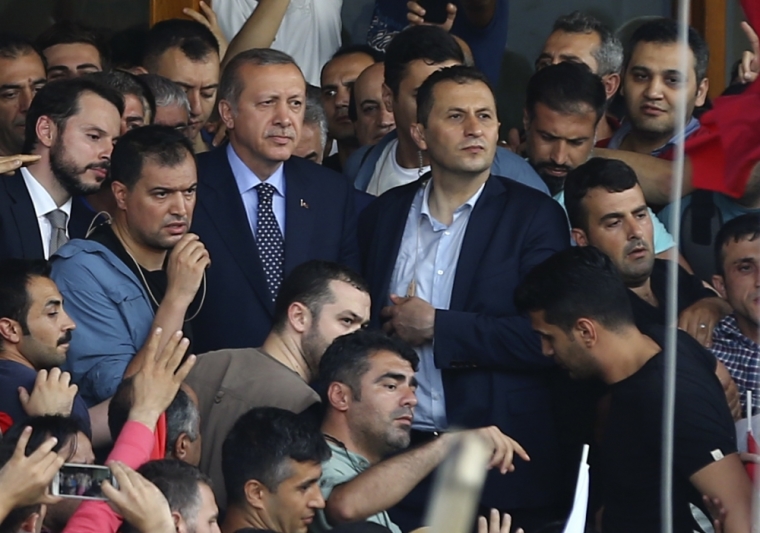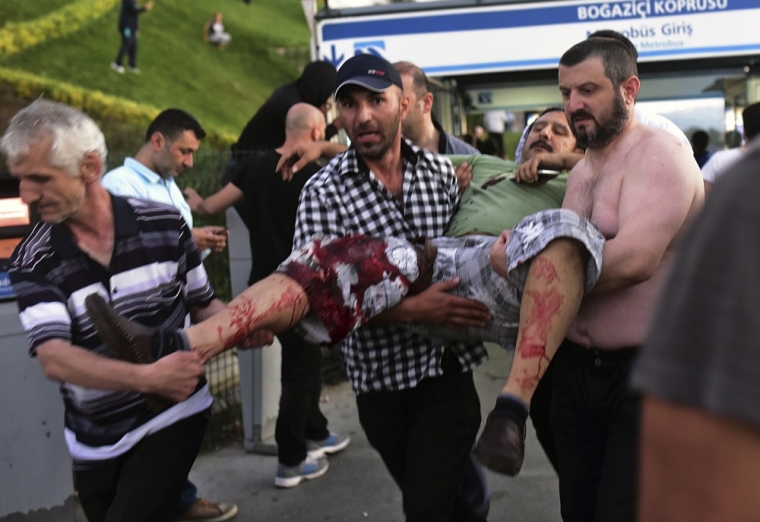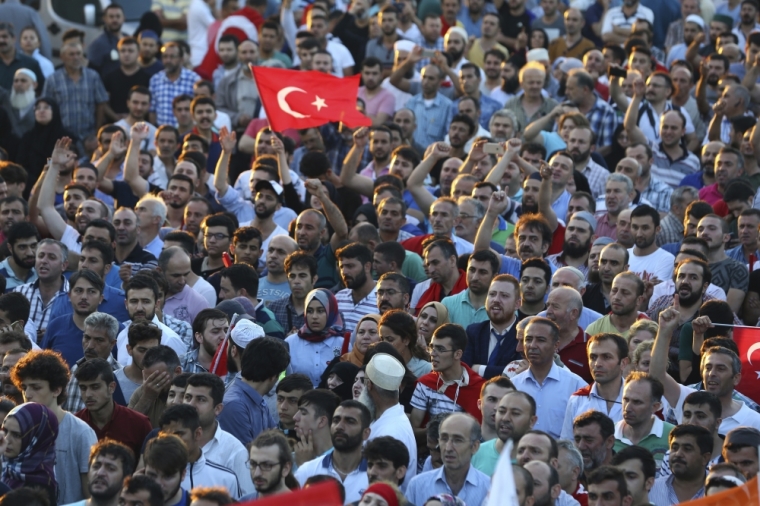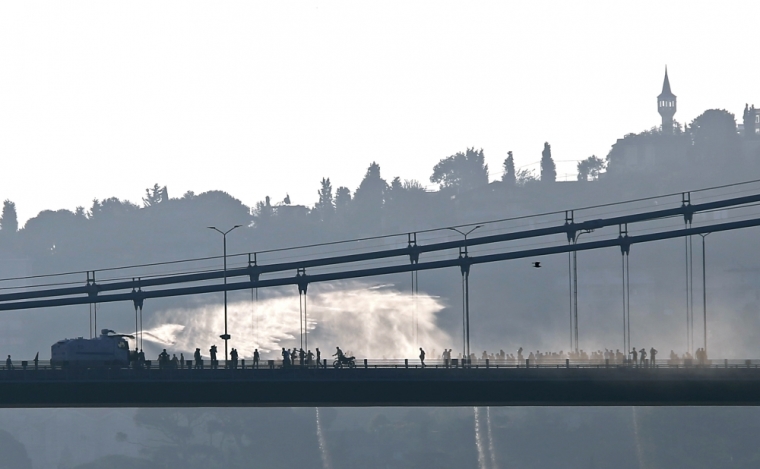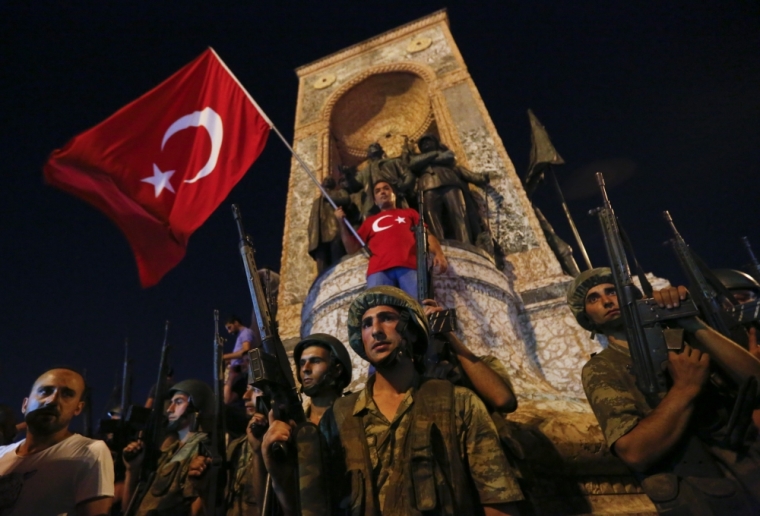Erdogan Cracks Down After Coup Attempt: Detains Nearly 3K Soldiers, Removes 2,745 Judges From Office
UPDATE: 9:50 AM ET: A total of 2,839 members of Turkey's military have been detained in connection with an attempted coup overnight, Prime Minister Binali Yildirim said on Saturday, adding that those detained included ordinary soldiers and high-ranking officers.
Yildirim, in a news conference in the capital Ankara, said the situation was fully under control and that "our commanders" were in charge of the military. He called on Turkish citizens to fill town and city squares with flags on Saturday evening and said parliament would meet at 1200 GMT to discuss the attempt.
(Reporting by Gulsen Solaker, Asli Kandemir, Can Sezer; and Ayla Jean Yackley; writing by David Dolan; editing by David Clarke)
ISTANBUL/ANKARA — An attempted Turkish military coup appeared to crumble in the early hours of Saturday after crowds answered President Tayyip Erdogan's call to take to the streets to support him.
Erdogan, who had been holidaying on the southwest coast when the coup was launched by a faction in the armed forces, flew into Istanbul before dawn on Saturday and was shown on TV appearing among a crowd of supporters outside Ataturk Airport.
The uprising was an "act of treason", and those responsible would pay a heavy price, he later told reporters at a hastily arranged news conference. Arrests of officers were under way, and it would go higher up the ranks, culminating in the cleansing of the military, he said.
Soldiers took control of the airport soon after Erdogan had landed, Reuters witnesses said. A senior official later said the soldiers were loyal to the government.
Rebel soldiers who had taken control of military aircraft were still firing from the air early on Saturday and fighter jets had been scrambled to intercept them, Prime Minister Binali Yildirim said, underscoring the chaotic situation.
Gunfire and explosions rocked both the main city Istanbul and capital Ankara in a chaotic night after soldiers took up positions in both cities and ordered state television to read out a statement declaring they had taken power.
A senior official said 42 people had been killed in the violence in Ankara alone, most of them civilians. More deaths were also reported in Istanbul.
Early on Saturday, Reuters journalists saw around 30 pro-coup soldiers surrender their weapons after being surrounded by armed police in Istanbul's central Taksim square.
They were taken away in police vans as a fighter jet repeatedly screeched overhead at low altitude, causing a boom that shook surrounding buildings and shattered windows.
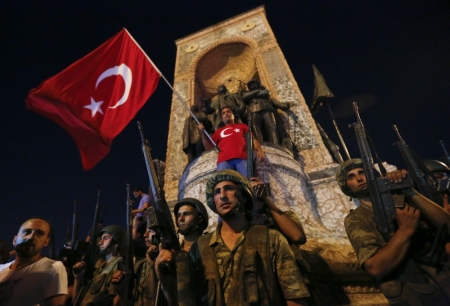
A successful overthrow of Erdogan, who has ruled Turkey since 2003, would have marked one of the biggest shifts in the Middle East in years, transforming one of the most important U.S. allies while war rages on its border. A failed coup attempt could still destabilise a pivotal country.
Before returning to Istanbul, Erdogan appeared in a video call to the studio of the Turkish sister channel of CNN, where an announcer held up a mobile phone to the camera to show him. He called on Turks to take to the streets to defend his government and said the coup plotters would pay a heavy price.
Lawmakers in hiding
By the early hours of Saturday, lawmakers were still hiding in shelters inside the parliament building in Ankara, which was being fired on by tanks. Smoke rose up from nearby, Reuters witnesses said. An opposition MP told Reuters parliament was hit three times and that people had been wounded.
A Turkish military commander said fighter jets had shot down a helicopter used by the coup plotters over Ankara. State-run Anadolu news agency said 17 police were killed at special forces headquarters there.
Momentum turned against the coup plotters as the night wore on. Crowds defied orders to stay indoors, gathering at major squares in Istanbul and Ankara, waving flags and chanting.
"We have a prime minister, we have a chief of command, we're not going to leave this country to degenerates," shouted one man, as groups of government supporters climbed onto a tank near Ataturk airport.
Erdogan and other officials blamed the attempted coup on followers of Fethullah Gulen, an influential cleric in self-imposed exile in the United States who once supported Erdogan but became a nemesis.
The pro-Gulen Alliance for Shared Values said it condemned any military intervention in domestic politics.
U.S. Secretary of State John Kerry said he phoned the Turkish foreign minister and emphasised "absolute support for Turkey's democratically elected, civilian government and democratic institutions."
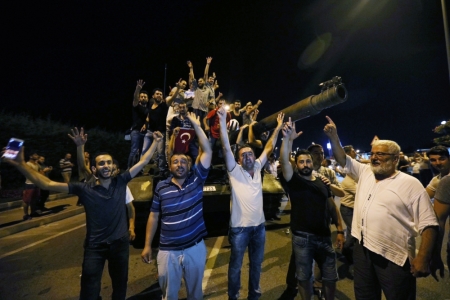
The coup began with warplanes and helicopters roaring over Ankara and troops moving in to seal off the bridges over the Bosphorus Strait that links Europe and Asia in Istanbul.
Authorities had shut the strait to tanker traffic, shipping agent GAC said.
Reuters reporters saw a helicopter open fire in Ankara. Anadolu said military helicopters had fired on the headquarters of the intelligence agency.
Social media cut off
Airports were shut and access to internet social media sites was cut off in the first hours of the coup attempt.
Soldiers took control of TRT state television, which announced a countrywide curfew and martial law. An announcer read a statement on the orders of the military that accused the government of eroding the democratic and secular rule of law. Turkey would be run by a "peace council" that would ensure the safety of the population, the statement said.
TRT went off the air shortly afterwards. It resumed broadcasting in the early hours of Saturday.
Anadolu said the chief of Turkey's military staff was among people taken "hostage" in the capital Ankara but Prime Minister Yildirim later said he was back in control.
The coup had appeared strong early on Friday evening. A senior EU source monitoring the situation said: "It looks like a relatively well-orchestrated coup by a significant body of the military, not just a few colonels ... They control several strategic points in Istanbul."
One European diplomat was dining with the Turkish ambassador to a European capital when guests were interrupted by the pinging of urgent news on their mobile phones.
"This is clearly not some tinpot little coup. The Turkish ambassador was clearly shocked and is taking it very seriously," the diplomat told Reuters as the dinner party broke up. "However it looks in the morning, this will have massive implications for Turkey. This has not come out of nowhere."
Turkey, a NATO member with the second biggest military in the Western alliance, is one of the most important allies of the United States in the fight against the Islamic State militant group, which seized swaths of neighbouring Iraq and Syria.
The Pentagon said there was no impact on operations against Islamic State from the U.S. air base at Incirlik in Turkey.
Turkey is also one of the main backers of opponents of Syrian President Bashar al-Assad in that country's civil war, host to 2.7 million Syrian refugees and launchpad last year for the biggest influx of migrants to Europe since World War II.
Celebratory gunfire erupted in Syria's capital Damascus after the army claimed to have toppled Erdogan. People took to the streets to celebrate there and in other government-held cities.
Turkey has been at war with Kurdish separatists and has suffered numerous bombing and shooting attacks this year, including an attack two weeks ago by Islamists at Ataturk airport that killed more than 40 people.
After serving as prime minister from 2003, Erdogan was elected president in 2014 with plans to alter the constitution to give the previously ceremonial presidency far greater executive powers.
Turkey has enjoyed an economic boom during his time in office and has dramatically expanded its influence across the region. However, opponents say his rule has become increasingly authoritarian.
His AK Party, with roots in Islamism, has long had a strained relationship with the military and nationalists in a state that was founded on secularist principles after World War One. The military has a history of mounting coups to defend secularism, but has not seized power directly since 1980.
(Reporting by Humeyra Pamuk, Ayla Jean Yackley, Nick Tattersall, David Dolan, Akin Aytekin, Tulay Karadeniz, Can Sezer, Gulsen Solaker, Ece Toksabay, Murad Sezer, Ercan Gurses, Nevzat Devranoglu, Dasha Afanasieva, Birsen Altayli and Orhan Coskun; Writing by Peter Graff and Lincoln Feast; Editing by Catherine Evans, Mary Milliken and Paul Tait)









